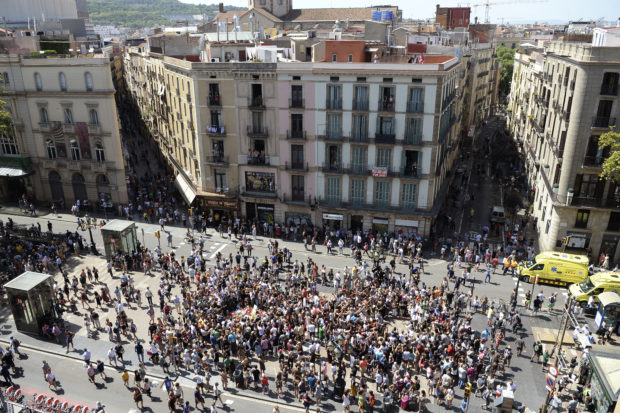Terror hits Spain; 14 dead

People gather to leave candles, flowers, messages, stuffed toys and many differents objects for the victims on August 18, 2017 at the spot where yesterday a van ploughed into the crowd, killing 14 persons and injuring over 100 on the Rambla boulevard in Barcelona. AFP
BARCELONA—At least 14 were dead and more than 100 others were wounded as Spain came under a terror attack that targeted two sites highly popular among tourists and used weapons that didn’t eject bullets or blast charges but were as deadly—motor vehicles.
Suspects described by Islamic State (IS) as its “soldiers” drove through pedestrians in two separate attacks launched in quick succession in Barcelona and Cambrils, a popular seaside city resort 120 kilometers south of Barcelona.
In the first attack, a suspect driving a white van sped into a street packed with tourists in central Barcelona on Thursday, knocking people out of the way and leaving at least 14 dead.
Some eight hours later in Cambrils, a seaside tourist area, an Audi A3 car slammed into pedestrians, wounding six civilians and one police officer. One of the wounded civilians was in critical condition.
Officials of Catalonia, the region where both Barcelona and Cambrils were located, said police shot dead four of the Cambrils attackers and a fifth died of gunshot wounds later.
They said the attack in Barcelona and Cambrils were likely to be linked.
Bodies on the street
While little more was known about the attack in Cambrils in the early hours of Friday, witnesses in Barcelona told of scenes of chaos and horror.
They recounted how bodies were strewn along the famous Las Ramblas Boulevard where the van driver went on a rampage as other people fled for their lives, screaming in panic.
The carnage in a city hugely popular with tourists from around the world was the latest in a wave of attacks in Europe using vehicles as weapons of terror.
As world leaders united in condemning the carnage, the IS propaganda agency Amaq claimed that it was carried out by its followers.
Police announced the arrest of two suspects—a Spaniard and a Moroccan—but said the van driver was still on the run.
“We’re united in grief,” Spanish Prime Minister Mariano Rajoy said in a televised address after rushing to Barcelona, the biggest city in Catalonia.
There were at least 18 nationalities among the Barcelona victims who came from countries as varied as France, Venezuela, Australia, Ireland, Peru, Algeria and China, according to Spain’s civil protection agency.
Belgium said one of its citizens was among those killed in the Las Ramblas assault, while The Hague said three Dutch were wounded. A Greek diplomat reported three nationals had been wounded—a woman and her two children.
Tourist spot
Las Ramblas is one of Barcelona’s busiest streets, lined with shops and restaurants and normally packed with tourists and street performers until well into the night.
“When it happened I ran out and saw the damage,” local shop worker Xavi Perez said.
“There were bodies on the ground with people crowding around them. People were crying. There were lots of foreigners.”
Footage broadcast on Spanish television showed a white van, its front crushed, abandoned on a road surrounded by police cars.
Tom Gueller, who lived on a road next to Las Ramblas, said he saw the vehicle speeding along the boulevard.
“It wasn’t slowing down at all. It was just going straight through the middle of the crowds in the middle of Ramblas,” he said.
Spain had until now been spared the kind of extremist violence that had rocked nearby France, Belgium and Germany.
But it was hit by what is still Europe’s deadliest jihadi attack in March 2004, when bombs exploded on commuter trains in Madrid, killing 191 people in an attack claimed by al-Qaida, a terror network founded by Osama bin Laden, who is now dead.
Spanish citizen
Police said on Thursday that one of the arrested suspects in the Barcelona attack was a Spaniard born in Melilla, a Spanish territory on Morocco’s north coast, and the other a Moroccan identified as Driss Oukabir.
The Spaniard was arrested in Alcanar, some 200 km south of Barcelona, the scene of an explosion in a house late Wednesday that left one person dead and seven wounded and which was believed to be linked to Thursday’s attacks.
“We suspect that they (the occupants) were preparing an explosive device,” Josep Lluis Trapero of the regional Catalonia police told reporters.
Thursday’s attacks drew condemnation from across the globe.
In the Philippines, Malacañang and the Department of Foreign Affairs issued separate statements condemning the attacks.
“We stand in solidarity with the people of Catalonia and all of Spain and the rest of the world as we fight this common scourge,” read a statement prepared for Foreign Secretary Alan Peter Cayetano.
“Our hearts and prayers go out to the families and loved ones of the innocent victims,” said Ernesto Abella, spokesperson in Malacañang, the Philippine presidential palace.
Most radicalized
US President Donald Trump condemned the attack and offered the United States’ help.
French President Emmanuel Macron said his thoughts were with the victims of the “tragic attack.” France had itself witnessed a series of bloody jihadi atrocities, including a truck rampage in Nice in July 2016 that killed 86 people.
The Barcelona and Cambrils attacks were believed to be the first being claimed by IS in Spain.
Catalonia has the highest concentration of radicalized Muslims in Spain along with Madrid and the Spanish territories of Ceuta and Melilla in northern Morocco.
According to the interior ministry, more than 190 “jihadi terrorists” had been arrested in Spain since 2015, most of them for propaganda, recruitment for extremist groups or “glorifying terrorism.” —AFP WITH MARLON RAMOS AND LEILA SALAVERRIA